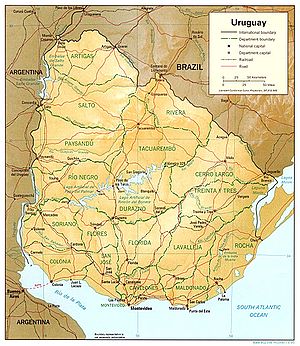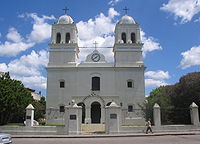
International rankings of Uruguay
Encyclopedia
The following are international rankings of  Uruguay.
Uruguay.




Health rankings
Other rankings
Comparative ranking by index
 Uruguay.
Uruguay.Culture

Energy
- Total electricity consumption ranked 88th highest consumption
Environment
- Carbon dioxide emissions per capita ranked 125th highest emissions
Geography

Government

Military
- Global Peace IndexGlobal Peace IndexThe Global Peace Index is an attempt to measure the relative position of nations' and regions' peacefulness. It is the product of Institute for Economics and Peace and developed in consultation with an international panel of peace experts from peace institutes and think tanks with data collected...
2009, ranked 25 - Military expenditures as a percentage of GDP ranked 104
Religion

Society
- Smoking in UruguaySmoking in UruguaySmoking in Uruguay in enclosed public spaces became illegal in March 2006. Now bars, restaurants or offices where people are caught smoking face fines of more than $1,100 or a three-day closure. Uruguay was the first country in Latin America to ban smoking in enclosed public spaces.Anti-smoking...
: first country in Latin America to establish an indoor smoking banSmoking banSmoking bans are public policies, including criminal laws and occupational safety and health regulations, which prohibit tobacco smoking in workplaces and/or other public spaces...
Political and economic
- GDP per capita – 60th highest, at I$11,969
- Human Development Index – 46th high, at 0.852
- Income Equality, 0.449 (Gini Index)
- Literacy Rate – 51st, at 97.7%
- Unemployment rate – 112th, at 8.70%
Health
- Fertility rate- 140th most fertile, at 1.85 per woman
- Birth rate – 157th most births, at 13.91 per 1000 people
- Infant mortality – 128th most deaths, at 1 per 1000 live births
- Birth rate – 157th most births, at 13.91 per 1000 people
- Death rate – 84th highest death rate, at 9.16 per 1000 people
- Life Expectancy – 47th highest, at 76.4 years
- Suicide Rate – 24th highest suicide rate, at 15.1 for males and 6.4 for females per 100,000 people
- HIV/AIDS rate – 108th most cases, at 0.30%
Latin America comparative index
| Index (Year) | Author / Editor / Source | Year of publication |
Countries sampled |
World Ranking (1) |
Ranking L.A.(2) |
| Human Poverty, HPI-1 (2005) Human Poverty Index The Human Poverty Index is an indication of the standard of living in a country, developed by the United Nations . For highly developed countries, the UN considers that it can better reflect the extent of deprivation compared to the Human Development Index.... (3) |
United Nations (UNDP) | |
108 | 2º | |
| Poverty below $2 a day (1990–2005) Measuring poverty Although the most severe poverty is in the developing world, there is evidence of poverty in every region. In developed countries, this condition results in wandering homeless people and poor suburbs and ghettos. Poverty may be seen as the collective condition of poor people, or of poor groups, and... (4) |
United Nations (UNDP) | |
71 | 3º | |
| Global Peace (2009) Global Peace Index The Global Peace Index is an attempt to measure the relative position of nations' and regions' peacefulness. It is the product of Institute for Economics and Peace and developed in consultation with an international panel of peace experts from peace institutes and think tanks with data collected... |
The Economist The Economist The Economist is an English-language weekly news and international affairs publication owned by The Economist Newspaper Ltd. and edited in offices in the City of Westminster, London, England. Continuous publication began under founder James Wilson in September 1843... |
|
140 | 21º | |
| Corruption Perception (2008) Corruption Perceptions Index Since 1995, Transparency International publishes the Corruption Perceptions Index annually ranking countries "by their perceived levels of corruption, as determined by expert assessments and opinion surveys." The CPI generally defines corruption as "the misuse of public power for private... (6) |
Transparency International Transparency International Transparency International is a non-governmental organization that monitors and publicizes corporate and political corruption in international development. It publishes an annual Corruption Perceptions Index, a comparative listing of corruption worldwide... |
|
180 | 23º | |
| Democracy (2006) Democracy Index The Democracy Index is an index compiled by the Economist Intelligence Unit that claims to measure the state of democracy in 167 countries, of which 166 are sovereign states and 165 are UN member states... |
The Economist The Economist The Economist is an English-language weekly news and international affairs publication owned by The Economist Newspaper Ltd. and edited in offices in the City of Westminster, London, England. Continuous publication began under founder James Wilson in September 1843... |
|
167 | 23º | |
| Prosperity Index (2008) Legatum Prosperity Index The Legatum Prosperity Index is an annual ranking developed by the Legatum Institute of 110 countries. The ranking is based according to a variety of factors including wealth, economic growth, personal wellbeing, and quality of life. Norway topped the lists of the the last two reports, those of... |
Legatum Institute Legatum LEGATUM is a privately owned, international investment organisation, headquartered in Dubai, part of the United Arab Emirates. Legatum's mission is to find ways to generate and allocate the capital and ideas that help people live more prosperous lives.... |
104 | 36º | |
|
| Press Freedom (2007) | Reporters Without Borders Reporters Without Borders Reporters Without Borders is a France-based international non-governmental organization that advocates freedom of the press. It was founded in 1985, by Robert Ménard, Rony Brauman and the journalist Jean-Claude Guillebaud. Jean-François Julliard has served as Secretary General since 2008... |
|
169 | 37º | |
| Economic Freedom (2008) Index of Economic Freedom The Index of Economic Freedom is a series of 10 economic measurements created by The Heritage Foundation and The Wall Street Journal. Its stated objective is to measure the degree of economic freedom in the world's nations.... |
The Wall Street Journal The Wall Street Journal The Wall Street Journal is an American English-language international daily newspaper. It is published in New York City by Dow Jones & Company, a division of News Corporation, along with the Asian and European editions of the Journal.... |
|
157 | 38º | |
| Human Development (2005) Human Development Index The Human Development Index is a composite statistic used to rank countries by level of "human development" and separate "very high human development", "high human development", "medium human development", and "low human development" countries... |
United Nations (UNDP) | |
177 | 46º | |
| Quality-of-life (2005) Quality-of-life index The Economist Intelligence Unit’s quality-of-life index is based on a unique methodology that links the results of subjective life-satisfaction surveys to the objective determinants of quality of life across countries... |
The Economist The Economist The Economist is an English-language weekly news and international affairs publication owned by The Economist Newspaper Ltd. and edited in offices in the City of Westminster, London, England. Continuous publication began under founder James Wilson in September 1843... |
|
111 | 46º | |
| Travel and Tourism Competitiveness (2008) Travel and Tourism Competitiveness Report The Travel and Tourism Competitiveness Report was first published in 2007 by the World Economic Forum. The 2007 report covered 124 major and emerging economies. The 2008 report covered 130 countries,, the 2009 report expanded to 133 countries, and the 2011 report to 139 countries... |
World Economic Forum World Economic Forum The World Economic Forum is a Swiss non-profit foundation, based in Cologny, Geneva, best known for its annual meeting in Davos, a mountain resort in Graubünden, in the eastern Alps region of Switzerland.... |
|
130 | 63º | |
| Global Competitiveness (2009–2010) Global Competitiveness Report The Global Competitiveness Report is a yearly report published by the World Economic Forum. The first report was released in 1979. The 2011–2012 report covers 142 major and emerging economies.... |
World Economic Forum World Economic Forum The World Economic Forum is a Swiss non-profit foundation, based in Cologny, Geneva, best known for its annual meeting in Davos, a mountain resort in Graubünden, in the eastern Alps region of Switzerland.... |
|
131 | 65º | |
| Income inequality (1989–2007)(5) | United Nations (UNDP) | |
126 | 88º | |
- (1) Worldwide ranking among countries evaluated.
- (2) Ranking among the 20 Latin American countries (Puerto RicoPuerto RicoPuerto Rico , officially the Commonwealth of Puerto Rico , is an unincorporated territory of the United States, located in the northeastern Caribbean, east of the Dominican Republic and west of both the United States Virgin Islands and the British Virgin Islands.Puerto Rico comprises an...
is not included). - (3) Ranking among 108 developing countries with available data only.
- (4) Ranking among 71 developing countries with available data only. Countries in the sample surveyed between 1990 and 2005. Refers to population below income poverty line as defined by the World BankWorld BankThe World Bank is an international financial institution that provides loans to developing countries for capital programmes.The World Bank's official goal is the reduction of poverty...
's $2 per day indicator - (5) Because the Gini coefficientGini coefficientThe Gini coefficient is a measure of statistical dispersion developed by the Italian statistician and sociologist Corrado Gini and published in his 1912 paper "Variability and Mutability" ....
used for the ranking corresponds to different years depending of the country, and the underlying household surveys differ in method and in the type of data collected, the distribution data are not strictly comparable across countries. The ranking therefore is only a proxy for reference purposes, and though the source is the same, the sample is smaller than for the HDI - (6) The 2008 CPI for Uruguay is equal to that of ChileChileChile ,officially the Republic of Chile , is a country in South America occupying a long, narrow coastal strip between the Andes mountains to the east and the Pacific Ocean to the west. It borders Peru to the north, Bolivia to the northeast, Argentina to the east, and the Drake Passage in the far...
, therefore both countries are tied in first place for Latin America.
Other
Political and economic rankings- GDP per capita – 60th highest, at I$11,969
- Human Development Index – 46th highest, at 0.852
- Income Equality, 0.449 (Gini Index)
- Literacy Rate – 51st, at 97.7%
- Unemployment rate – 112th, at 8.70%
Health rankings
- Fertility rate- 140th most fertile, at 1.85 per woman
- Birth rate – 157th most births, at 13.91 per 1000 people
- Infant mortality – 128th most deaths, at 1 per 1000 live births
- Birth rate – 157th most births, at 13.91 per 1000 people
- Death rate – 84th highest death rate, at 9.16 per 1000 people
- Life Expectancy – 47th highest, at 76.4 years
- Suicide Rate – 24th highest suicide rate, at 15.1 for males and 6.4 for females per 100,000 people
- HIV/AIDS rate – 108th most cases, at 0.30%
Other rankings
- CO2 emissions – 125th highest emissions, at 1.65 tonnes per capita
- Electricity Consumption – 88th highest consumption of electricity, at 7,762,000,000 kWh
- Broadband Internet access – no data
- Global Peace IndexGlobal Peace IndexThe Global Peace Index is an attempt to measure the relative position of nations' and regions' peacefulness. It is the product of Institute for Economics and Peace and developed in consultation with an international panel of peace experts from peace institutes and think tanks with data collected...
– 25th highest peace rate in 2009
Comparative ranking by index
| Index (Year) | Author / Editor / Source | Year of publication |
Countries sampled |
World Ranking (1) |
Ranking L.A.(2) |
| Global Peace (2009) Global Peace Index The Global Peace Index is an attempt to measure the relative position of nations' and regions' peacefulness. It is the product of Institute for Economics and Peace and developed in consultation with an international panel of peace experts from peace institutes and think tanks with data collected... |
The Economist The Economist The Economist is an English-language weekly news and international affairs publication owned by The Economist Newspaper Ltd. and edited in offices in the City of Westminster, London, England. Continuous publication began under founder James Wilson in September 1843... |
|
140 | 21º | |
| Corruption Perception (2008) Corruption Perceptions Index Since 1995, Transparency International publishes the Corruption Perceptions Index annually ranking countries "by their perceived levels of corruption, as determined by expert assessments and opinion surveys." The CPI generally defines corruption as "the misuse of public power for private... (6) |
Transparency International Transparency International Transparency International is a non-governmental organization that monitors and publicizes corporate and political corruption in international development. It publishes an annual Corruption Perceptions Index, a comparative listing of corruption worldwide... |
|
180 | 23º | |
| Democracy (2006) Democracy Index The Democracy Index is an index compiled by the Economist Intelligence Unit that claims to measure the state of democracy in 167 countries, of which 166 are sovereign states and 165 are UN member states... |
The Economist The Economist The Economist is an English-language weekly news and international affairs publication owned by The Economist Newspaper Ltd. and edited in offices in the City of Westminster, London, England. Continuous publication began under founder James Wilson in September 1843... |
|
167 | 23º | |
| Prosperity Index (2008) Legatum Prosperity Index The Legatum Prosperity Index is an annual ranking developed by the Legatum Institute of 110 countries. The ranking is based according to a variety of factors including wealth, economic growth, personal wellbeing, and quality of life. Norway topped the lists of the the last two reports, those of... |
Legatum Institute Legatum LEGATUM is a privately owned, international investment organisation, headquartered in Dubai, part of the United Arab Emirates. Legatum's mission is to find ways to generate and allocate the capital and ideas that help people live more prosperous lives.... |
104 | 36º | |
|
| Press Freedom (2007) | Reporters Without Borders Reporters Without Borders Reporters Without Borders is a France-based international non-governmental organization that advocates freedom of the press. It was founded in 1985, by Robert Ménard, Rony Brauman and the journalist Jean-Claude Guillebaud. Jean-François Julliard has served as Secretary General since 2008... |
|
169 | 37º | |
| Economic Freedom (2008) Index of Economic Freedom The Index of Economic Freedom is a series of 10 economic measurements created by The Heritage Foundation and The Wall Street Journal. Its stated objective is to measure the degree of economic freedom in the world's nations.... |
The Wall Street Journal The Wall Street Journal The Wall Street Journal is an American English-language international daily newspaper. It is published in New York City by Dow Jones & Company, a division of News Corporation, along with the Asian and European editions of the Journal.... |
|
157 | 38º | |
| Networked Readiness Index Networked readiness index The World Economic Forum's Networked Readiness Index measures the propensity for countries to exploit the opportunities offered by information and communications technology. It is published annually. The NRI seeks to better comprehend the impact of ICT on the competitiveness of nations... (2010–2011) (Global Information Technology Report) |
World Economic Forum World Economic Forum The World Economic Forum is a Swiss non-profit foundation, based in Cologny, Geneva, best known for its annual meeting in Davos, a mountain resort in Graubünden, in the eastern Alps region of Switzerland.... |
|
138 | 45º | |
| Human Development (2005) Human Development Index The Human Development Index is a composite statistic used to rank countries by level of "human development" and separate "very high human development", "high human development", "medium human development", and "low human development" countries... |
United Nations (UNDP) | |
177 | 46º | |
| Quality-of-life (2005) Quality-of-life index The Economist Intelligence Unit’s quality-of-life index is based on a unique methodology that links the results of subjective life-satisfaction surveys to the objective determinants of quality of life across countries... |
The Economist The Economist The Economist is an English-language weekly news and international affairs publication owned by The Economist Newspaper Ltd. and edited in offices in the City of Westminster, London, England. Continuous publication began under founder James Wilson in September 1843... |
|
111 | 46º | |
| Travel and Tourism Competitiveness (2008) Travel and Tourism Competitiveness Report The Travel and Tourism Competitiveness Report was first published in 2007 by the World Economic Forum. The 2007 report covered 124 major and emerging economies. The 2008 report covered 130 countries,, the 2009 report expanded to 133 countries, and the 2011 report to 139 countries... |
World Economic Forum World Economic Forum The World Economic Forum is a Swiss non-profit foundation, based in Cologny, Geneva, best known for its annual meeting in Davos, a mountain resort in Graubünden, in the eastern Alps region of Switzerland.... |
|
130 | 63º | |
| Global Competitiveness (2009–2010) Global Competitiveness Report The Global Competitiveness Report is a yearly report published by the World Economic Forum. The first report was released in 1979. The 2011–2012 report covers 142 major and emerging economies.... |
World Economic Forum World Economic Forum The World Economic Forum is a Swiss non-profit foundation, based in Cologny, Geneva, best known for its annual meeting in Davos, a mountain resort in Graubünden, in the eastern Alps region of Switzerland.... |
|
131 | 65º | |
| Income inequality (1989–2007)(5) | United Nations (UNDP) | |
126 | 88º | |
- (1) Worldwide ranking among countries evaluated.
- (2) Ranking among the 20 Latin American countries (Puerto RicoPuerto RicoPuerto Rico , officially the Commonwealth of Puerto Rico , is an unincorporated territory of the United States, located in the northeastern Caribbean, east of the Dominican Republic and west of both the United States Virgin Islands and the British Virgin Islands.Puerto Rico comprises an...
is not included). - (3) Ranking among 108 developing countries with available data only.
- (4) Ranking among 71 developing countries with available data only. Countries in the sample surveyed between 1990 and 2005. Refers to population below income poverty line as defined by the World BankWorld BankThe World Bank is an international financial institution that provides loans to developing countries for capital programmes.The World Bank's official goal is the reduction of poverty...
's $2 per day indicator - (5) Because the Gini coefficientGini coefficientThe Gini coefficient is a measure of statistical dispersion developed by the Italian statistician and sociologist Corrado Gini and published in his 1912 paper "Variability and Mutability" ....
used for the ranking corresponds to different years depending of the country, and the underlying household surveys differ in method and in the type of data collected, the distribution data are not strictly comparable across countries. The ranking therefore is only a proxy for reference purposes, and though the source is the same, the sample is smaller than for the HDI - (6) The 2008 CPI for Uruguay is equal to that of ChileChileChile ,officially the Republic of Chile , is a country in South America occupying a long, narrow coastal strip between the Andes mountains to the east and the Pacific Ocean to the west. It borders Peru to the north, Bolivia to the northeast, Argentina to the east, and the Drake Passage in the far...
, therefore both countries are tied in first place for Latin America.

